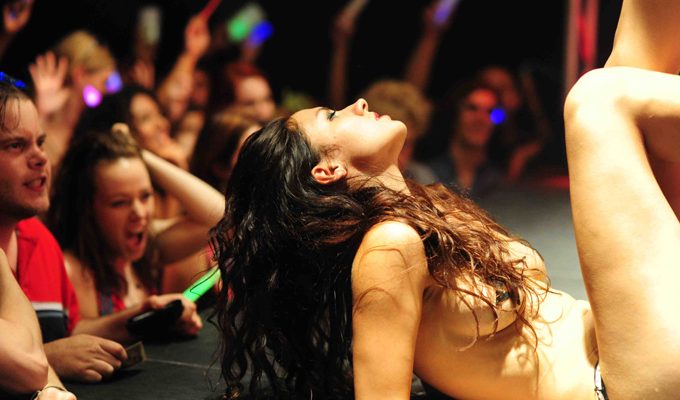It’s the end of the world and the kids can’t stop partying in “+1,” the new
horror whatzit from director Dennis Iliadis. Not that you’d know it from the
reactions of the characters involved in this slightly off-center genre picture’s young partygoers who may or may not be emblematic of the youth of today.
When it’s emphasized that there is danger afoot, their drunken cries to keep
the music playing bellow in unison. God help us if Iliadis actually does have
his finger on the pulse of Generation iPod, or whatever they’re ironically
(post-ironically?) calling themselves. And get them off our lawn.

Rhys Wakefield, last seen terrorizing the suburbs in “The Purge,” brings his
rictus grin to the lead of this film, a semi-flat loverboy whom, we’re told
later, can’t seem to find that extra motivation in life to exist beyond being a
successful student who is really, terribly good looking. Wakefield is matched
with Ashley Hinshaw, and the two look like they might as well be from different, but still good looking, universes: she is limber and model-pretty, and
he has a positively Satanic grin that serves him better as an antagonist than
as a likable lead character. It’s the kind of film that doesn’t pause for
character-building until maybe thirty minutes in, and you have to spend the
first third of the film wondering if Wakefield’s David is the villain.
After a hypnotic moment of infidelity that can’t be explained by simple
logic, David finds himself on the outs with Hinshaw’s Jill, following her to a
massive house party highlighted by an obscene amount of excess. There are the
strippers on a giant outdoor stage! There is the nude Asian woman allowing everyone
to eat food off her body! Let’s light a tennis ball on fire and bat it around!
Either Iliadis is subtly critiquing American youth culture, or, more likely,
he’s never actually experienced it. It’s unclear as to whether the film is
operating on bizarre dream logic (that approaching asteroid can’t possibly be
real, no?), or events are already subtly spiraling out of control.

Once that asteroid lands, David’s wooing strategy is interrupted by an
unlikely threat: the partygoers are beginning to multiply, and doppelgängers
have infiltrated the house, replaying events that occurred moments earlier.
While these doubles appear to have murderous intentions, their main interest is
mimicry, and they pull it off quite well. There’s a point to be made about the
interchangeability of people at these massive college-age keggers (even before
the doubling, there are about three separate chubby, fratty jerks clip-clopping
through scenes like broken jalopies), but this film doesn’t have a single
skilled comedic performer, nor does it have a particularly trenchant point of
view or deeper observation.
The moments in between the sequences of violence and dread attempt to top
every movie house party you’ve ever seen, a highlight being a particularly graphic
sadomasochistic sex scene edited for maximum back-row titters. But the film is
so po-faced that you wonder what the point of all this is, let alone what we should
be hoping is the outcome. Struggling to bring gravity to the proceedings are
Wakefield and Hinshaw, who give off the heat of two slabs of baloney slapped
together. Even with a film loaded with unconvincing green-screen brawls where
actors have to beat themselves up, it’s unusual that the most artificial
element are the two people at the center of the film. By the time they are
multiplied, it’s as if Iliadis is doubling down on the film’s weakest elements.
[D]

